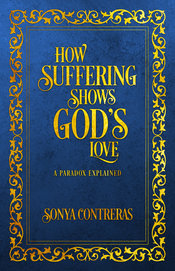- Home
- Index
-
My Books
- Book List
- Writing/Reading Articles Listing
-
My Short Stories
- What God Lost
- What God Lost — Part 2
- When Hope Was Lost
- A Battle in the Heavens
- To Live Forever
- Finding Peace
- Empty Hands
- From Fire and Thunder to Love and Submission
- The Coming One
- Forgiveness Made Possible
- The Innkeeper's Wife
- Do You Have The Right Words?
- The Lamb of God As Told by a Scribe
- What Love Is This?
- When Heaven Came Down
- Family
- Faith
What Was God Thinking to Make Us Suffer?
September 24, 2014
 We have discussed God’s love with regards to suffering. Today we look at where that love leads.
We have discussed God’s love with regards to suffering. Today we look at where that love leads.
Human suffering cannot be reconciled with the existence of a loving God IF we give ‘love’ a trivial meaning and allow man to be the center.
What does it mean to love?
You discipline your son, because you wish more than his immediate happiness, you desire his character to be disciplined. But you do not reprimand your neighbor’s son for wrong doing, because you do not care intimately about his character and thus his happiness. The parallel is true with God and His creation.
“It is for people whom we care nothing about that we demand happiness on any terms.” (Lewis, p. 41)
Why such love? The Creator values what He has created.
By wishing for less suffering, we wish not for more love but for less.
If we look at God as an artist and us the sketch, we wish He would be satisfied with a quick sketch of what He wants of us. But we wish not for more love but for less. Instead, He labors over the painting, blending colors here and making definite marks there.
 The Bible tells of the Church as the Lord’s bride. Christ desires no spot or wrinkle. Love demands perfecting. Love forgives all shortcomings, but desires their removal. Christ’s goal is to present His bride perfect, whole, unblemished, to “be a vessel for honor, sanctified useful to the Master, prepared for every good work.” (2 Timothy 2:21)
The Bible tells of the Church as the Lord’s bride. Christ desires no spot or wrinkle. Love demands perfecting. Love forgives all shortcomings, but desires their removal. Christ’s goal is to present His bride perfect, whole, unblemished, to “be a vessel for honor, sanctified useful to the Master, prepared for every good work.” (2 Timothy 2:21)
We ask for a God Who loves. We have one. He will not let us continue to do wrong. His love desires our best.
Man was created for God.
Not only do we wish for a trivial love when we question suffering, but we assume man is the center of things. Man is not the center. God does not exist for the sake of man. Man was created for God. Revelations 4:11 says, “Worthy are You… to receive glory and honor and power; for You created all things and because of Your will they existed, and were created.” We were created for His pleasure.
We are made, not to love God (although we should) but because God loves us. He created us so that He may be ‘well pleased.’
To demand that divine love be pleased with us, as we remain in our sin, is to ask God to cease to be God. His love is repelled by stains. Our happiness is not the end goal of Christ. He desires to make us like Him. He labors conforming us to Himself.
Our analogy of the father with his son does not completely parallel God with us, because the father may discipline for his own needs, restricting the son because he cannot let him go. But with God, He has no needs. God is goodness. He can give good, but does not need or get it. His love is limitless. He gives everything and requires nothing, unless He ‘requires’ something of His own choosing.
He chooses, although lacking nothing, to need us—it is not because He needs but rather because we need to be needed. (Lewis, p. 50)
For example, look at God’s glory. God’s glory cannot be diminished by man refusing to worship Him. Can we stop the sun from shining by going into a dark room and closing our eyes? God cannot stop being Who He is.
God wills our good. Our good is to love God. To love Him, we must know Him. If we know Him, we should fall to our faces in worship. If we do not, we show that what we love is not really God.
We are commanded to ‘put on Christ,’ to be like Him. God gives us what we need, not what we think we want. What we want, is not too much love, but too little.
We ask, “What was God thinking to make us suffer?”
God’s love is not what we could imagine. Our thoughts aren’t God’s thoughts. We leave with just a bit more of what it means for God to love us. And we are grateful.
Lewis, C.S. The Problem of Pain. NY: Macmillan Publishing Co., Inc., 1962. Pp. 41-53.
Scripture taken from the NEW AMERICAN STANDARD BIBLE®, Copyright © 1960, 1962, 1963, 1968, 1971, 1972, 1973, 1975, 1977, 1995 by The Lockman Foundation. Used by permission.
Did you enjoy this article? Share with your friends!
No comments found

Author of Biblical fiction, married to my best friend, and challenged by eight sons’ growing pains as I write about what matters.
Receive weekly articles by giving your email address below:








